My father did National Service and was lucky enough to end up in Trieste, which was probably the best posting around. He was assigned to the intelligence corps, his job to track down former members of the Croatian Ustaše, a pro-Nazi collaboration regime known for bloodthirstiness so extreme that even visiting Gestapo were shocked by their inhumanity.
I’m not sure if dad managed to get any Nazis brought to justice, but it inspired a love of Yugoslavia which led him to move to Sarajevo and become fluent in Serbo-Croat, and for the rest of his life he was obsessed with the Balkans – always a healthy pastime.
Not everyone was so lucky; his best friend got sent to Aden, which was hell on earth, enduring a terrifying insurgency in the desert, while another pal was posted to Cyprus, where he was killed by EOKA.
National Service was abolished in 1960, the last forced recruit bowing out in 1963, by which time Britain had wiggled out of most of its empire. But most countries retained it for long afterwards: Belgium didn’t abolish mandatory military service until 1992, the Netherlands until 1993 and Germany only abandoned the system in 2011 – and since the war in Ukraine some countries have pondered reintroducing it.
In Britain, reintroducing National Service used to be an obsession of the law-and-order right, seen as a solution to the hooliganism that began to become a feature of British society in the 1960s: Mods and Rockers, long-haired bohemian rock stars exemplified by Mick and Keith, and later football thugs. A spell in the army would knock some sense into them, so the argument went.
More recently, however, at least since the Blair era, National Service has become more a favourite of a particular strand of the centre-left, a remedy for a fractured country divided along lines of class, race and religion.
The idea featured in a recent article by former foreign secretary William Hague, a piece which exemplified the mindset of notional Conservatives who simply want to go back to their country house and sign the surrender papers.
In his call for us to just accept our country is going to be lost to us, because doing anything would be a bad look, Hague wrote: ‘If the future is one of continuing high levels of migration, the promotion of shared identity becomes even more important. Britain has done better on this than many of our neighbours – look at how many of our political leaders are children of immigrants. But we should not be complacent. The coming age of migration is another reason to ensure citizenship carries obligations as well as rights. Labour’s David Lammy put it well in advocating compulsory national service to “break down the divides that are becoming entrenched in modern society”. Such proposals for integration will be important. The age of migration is upon us. Political ideas need to be updated for it if deep polarisation and division are to be averted.’
I’m not sure we would have gained anything as a society by forcing the Beatles or the Rolling Stones to waste a couple of years fighting some pointless colonial war
His essential argument is that, while immigration will lead us to become more divided, and make our lives less pleasant, perhaps this can be remedied by forcing young people to sacrifice a year or two of their lives in the name of ‘cohesion’.
National Service has also been advocated by Adrian Pabst, one of the handful of thoughtful Blue Labour philosophers who want to reintroduce ideas of faith and family into the Left.
Pabst recently wrote that: ‘One way to renew social ties would be to introduce a year of national civic service for all adults. This could consist of two distinct strands: first, a national nature service, modelled on Franklin D. Roosevelt’s Civilian Conservation Corps (CCC), dedicated to cleaning up our polluted rivers, building flood defences, tree-planting, restoring biodiversity and domestic heating conversion. Roosevelt’s CCC was credited with improving the well-being and employability of young people – exactly what our labour market and our society need.
‘The second strand would be a national community service dedicated to helping understaffed hospitals and schools, teaching English to new arrivals, cleaning up graffiti and rebuilding communal space like village halls, playgrounds or parks which are often the target of anti-social behaviour. Social order is not the sole preserve of the police or the local council, but should be built by ordinary citizens in the places they call home.’
Such a service would need to be ‘universal and compulsory, so that people from all class and cultural backgrounds can come together and associate around a common purpose – serving their communities and their country’.
Pabst wrote that this will need ‘funding and institutions to deliver it’, but ‘If, after two devastating world wars Britain was capable of building the NHS and the welfare state, now is the moment to create a National Civic Service.’
Ben Sixsmith called the idea of all able-bodied Britons doing compulsory work ‘unswallowable’. The problem, and I tend to agree with him on this, is that ‘many of these problems stem from government itself’.
‘Cleaning up graffiti’ is good, for example, but it would boil my guts if I was compelled to do it while the cops remained blissfully incapable of doing anything to avert property crime and antisocial behaviour. Cleaning rivers is virtuous as well, but reforming Thames Water sounds like a more efficient and effective plan than forcing random people to do the job.
‘British governments have done a lot to pull Britons apart. It is state institutions, not citizens, which have encouraged more immigration than is assimilable, enabled the dire ubiquity of crime, imposed protracted lockdowns which bankrupted local businesses and starved civic institutions of funds. There is a significant extent, in other words, to which instead of putting citizens to work, politicians should be doing their own darn job.’
Few people of my father’s generation actually enjoyed National Service, but there was at least a purpose to it. Britain had an empire to run, or at least extract itself from, and a standing army had become normalised by the war. None of these issues exist today. We don’t have an empire, and while our military is underfunded, we don’t need a large standing army; conscript armies tend to be quite ineffective at any rate, and the US experience of conscription during the Vietnam era does not suggest it’s a remedy for cohesion problems. During that period America suffered from heightened levels of political violence – far worse than today – and the draft played a huge part.
I’m not sure if conscription would have reduced Britain’s rising crime rates in the 1960s, except by the simple process of incapacitating much of the male population. We could have achieved the same goals by simply jailing every young man for a couple of years, and like Sixsmith I dislike the collective punishment aspect of military service. Indeed, it is similar to the argument that children should remain in schools for longer stretches of time, punishing the well-behaved as much as troublemakers.
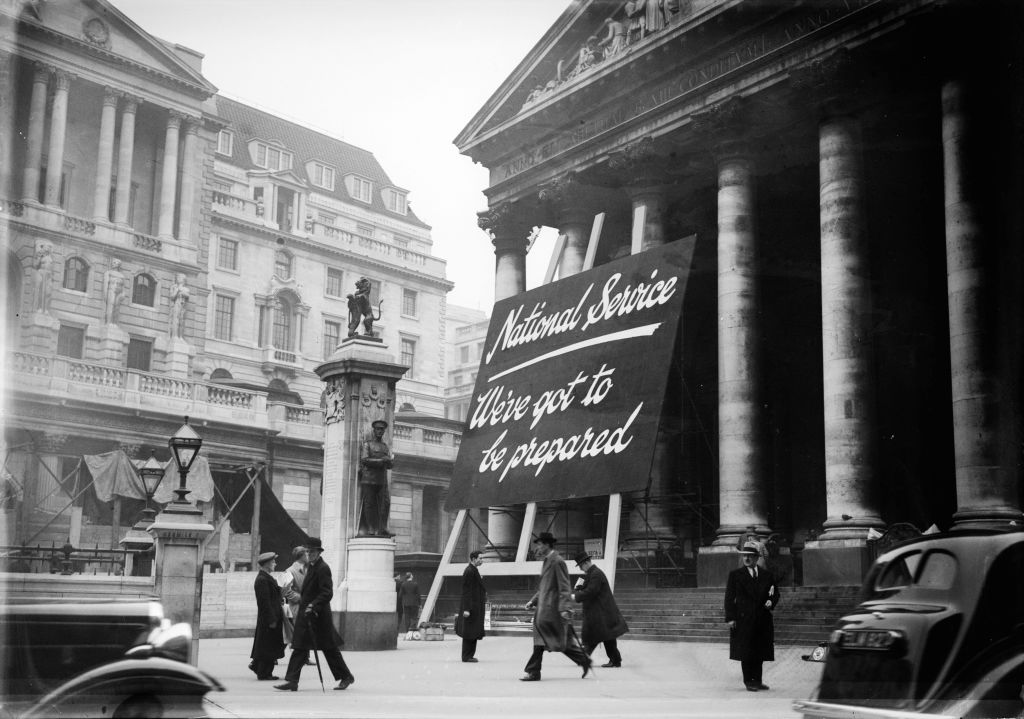 1939: A sign outside the Royal Exchange in London (Photo by General Photographic Agency/Getty Images)
1939: A sign outside the Royal Exchange in London (Photo by General Photographic Agency/Getty Images)
I’m not sure we would have gained anything as a society by forcing the Beatles or the Rolling Stones to waste a couple of years fighting some pointless colonial war, except denying us much loved music and making John Lennon even more bitter than he already was.
The years between 18 and 25 should be the happiest of a person’s life, and people should enjoy them before the weight of the world crushes their spirit. If there’s no need to sacrifice your best years for self-defence, there’s certainly no need to do so for ‘social solidarity’. Why should everyone suffer because governments have encouraged unwise and divisive levels of immigration?
We also don’t have a lot of young people. It’s strange that, in an article in which the former Conservative Party leader stated that we need more migrants to make up for our labour shortage, he then suggests taking millions of young people out of the labour market in the name of social solidarity.
Realistically they couldn’t do anything useful that couldn’t be better achieved through the market. Most of the rest of the time, apart from perhaps getting fitter, they would no doubt be indoctrinated in the ‘British values’ of the establishment, being lectured on the tenets of equality and diversity.
As Sixsmith argues: ‘I would bet at least half of my internal organs that a Labour government, and perhaps even a Conservative government, would have hapless Britons working for the sake of various corrosive political causes. You’d imagine building a ramp for the disabled and find yourself taking down statues and organising hideous performance poetry events. This is not Professor Pabst’s intention, of course, but many are the well-intentioned ideas that have been misused by opportunistic activists and politicians.’
People get a sense of purpose out of communal activities, and it’s when we’re most happy; I’m a great believer in the idea there is an oxytocin deficit and that explains a lot of unhappiness. But those communal events are best done voluntarily and naturally; those organised by the state tend to be either insipid or horrible.
Much of the desire for National Service comes down to an understandable nostalgia for the Attlee years, the urge to return to the hormonal rush of the 1940s when Britain was all in it together, a sense of solidarity we have never been able to recreate. This came across very strongly during lockdown, when there was overwhelming support for measures which were authoritarian and punishing, but applied equally.
The second world war may have brought an unprecedented level of social capital to British society, and raised equality levels, but the war communism of the 1940s was done out of necessity and under duress. We can’t reproduce it in peacetime, and we wouldn’t benefit in any way.
While many people still see the solidarity of 1939-45 as the apex of British patriotism, historically it was incredibly alien to us as a people. As A. J. P. Taylor famously observed, ‘until August 1914 a sensible, law-abiding Englishman could pass through life and hardly notice the existence of the state beyond the post office and the policeman’.
That was a country in which most people had no association with the Army – indeed many pubs didn’t even allow troops in – a civilian society which also enjoyed incredibly high levels of social solidarity. It’s also worth noting that the main reason why Britain won almost every major war between about 1700 and 1914 was not because of state-enforced unity, but because we were rich, and therefore able to raise huge amounts of money through the City of London (and pay other people to fight for us).
The state is not effective at raising social capital outside of wartime, and being shouted at by a sergeant major or, more likely, lectured to and harangued about systemic racism, is not going to install any sense of national community – beyond a shared sense of resentment among the young.
Got something to add? Join the discussion and comment below.
Get 10 issues for just $10
Subscribe to The Spectator Australia today for the next 10 magazine issues, plus full online access, for just $10.

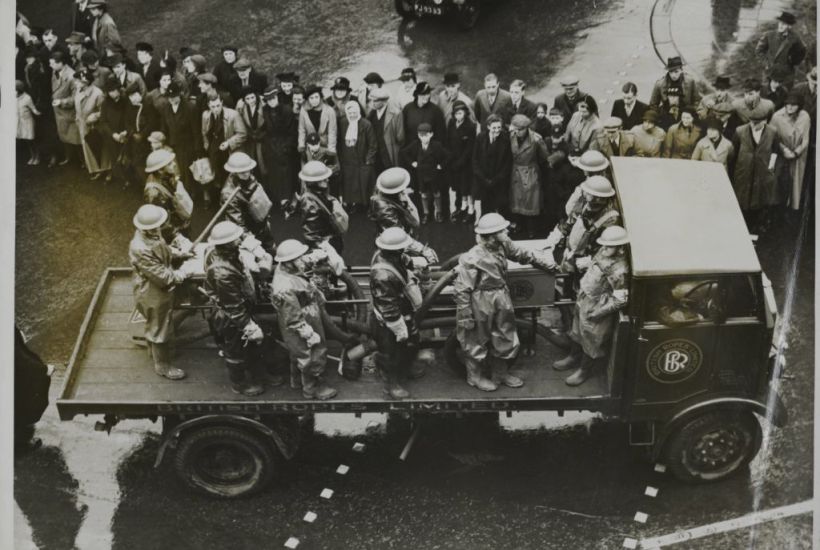

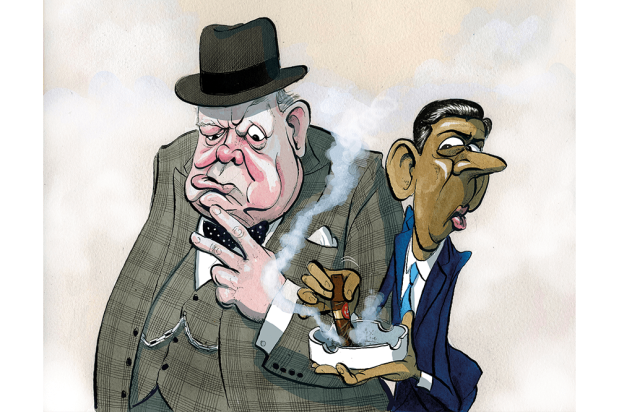

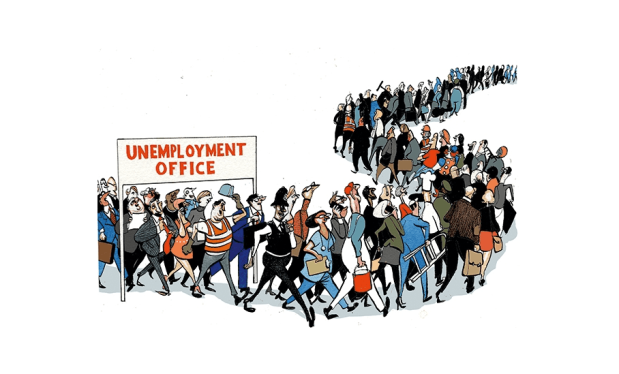

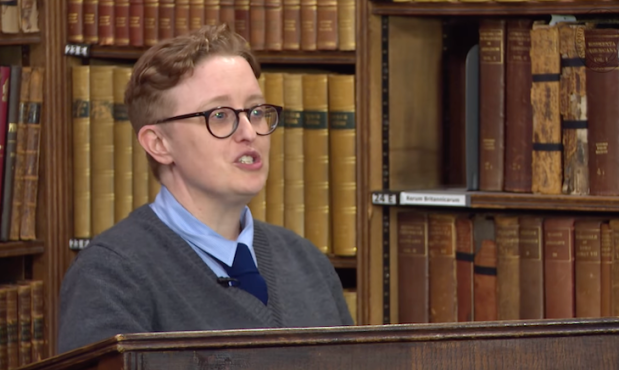












Comments
Don't miss out
Join the conversation with other Spectator Australia readers. Subscribe to leave a comment.
SUBSCRIBEAlready a subscriber? Log in